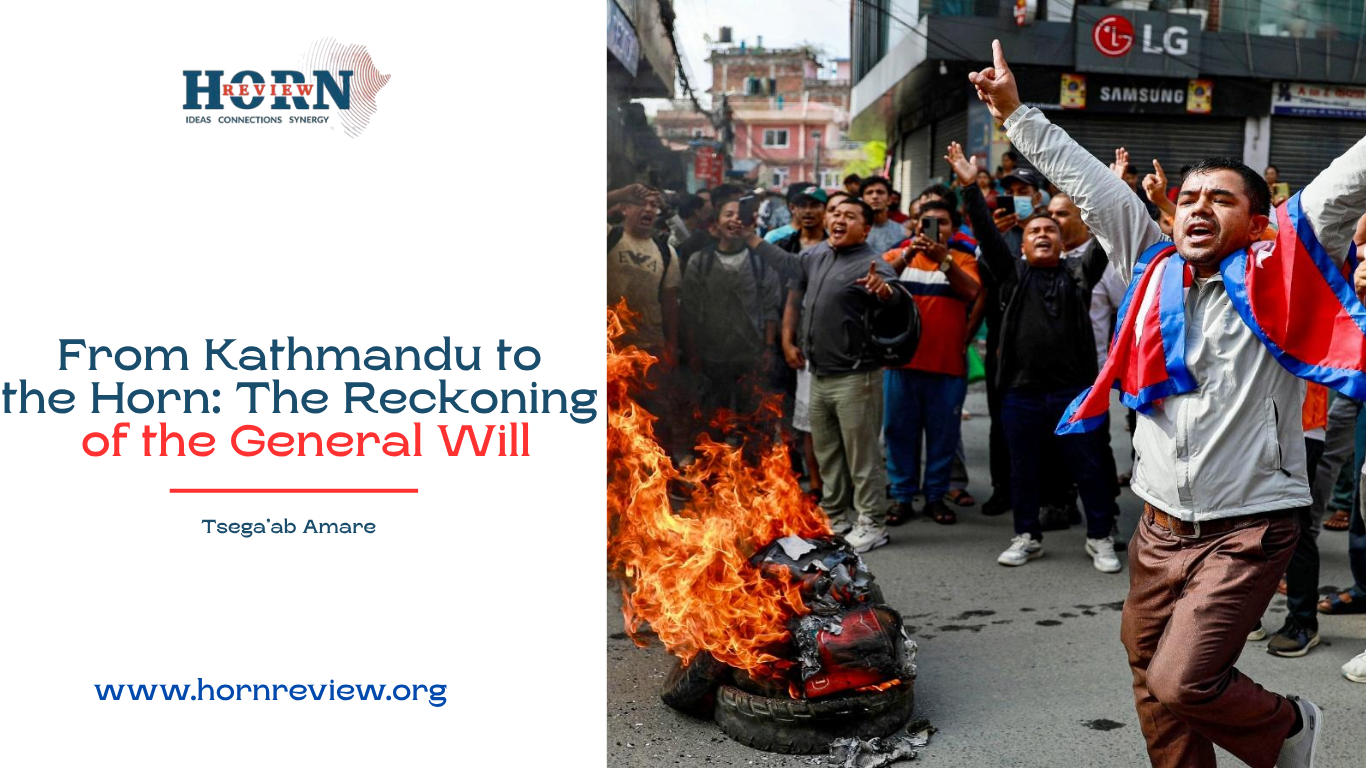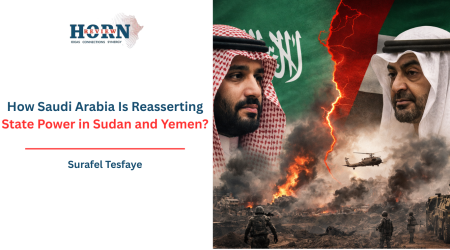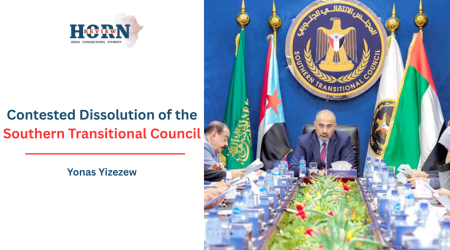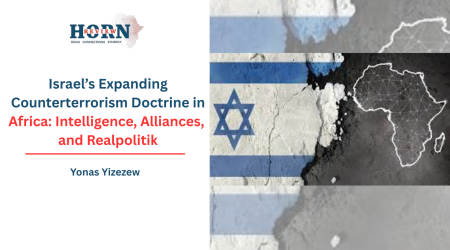
11
Oct
From Kathmandu to the Horn: The Reckoning of the General Will
Nepal’s recent political upheaval, propelled by a decentralized Gen-Z-led movement, has challenged the longstanding established order, serving as a compelling and timely case study in the dynamics of modern political reckoning.
The movement in Nepal exemplifies the fundamental principles of Jean-Jacques Rousseau’s doctrine in the Social Contract; when the general will, which has been suppressed for an extended period by the ambitions of a corrupt and self-serving elite, finally emerges to assert its sovereignty, the populace reclaims its rightful status as the sole source of legitimate authority. This movement is part of a broader wave, including the Horn of Africa, where youth-led political awakenings are increasingly challenging entrenched elites and demanding accountable governance.
Governments that cling to power as though it were personal property, detached from the collective will of the people, are increasingly vulnerable to a popular reckoning, one led by a tech-savvy generation demanding governance that is more authentic, accountable, and inclusive.
The Betrayal of the General Will
Rousseau’s concept of the general will, articulated in The Social Contract, is not merely the sum of individual desires. It is the collective will of the body politic, oriented toward the common good.For Rousseau, the sovereign power rests exclusively with the people, but it can be easily subverted by corrupted elites who act as self-interested factions. In Nepal, the last two decades since the end of the monarchy have seen a succession of governments that have systematically betrayed this principle.
The Gen-Z revolution of Nepal was not a spontaneous outburst but the culmination of deep-seated frustrations. The immediate trigger was a government ban on social media platforms, a move widely perceived as an attempt to silence online criticism of rampant corruption and nepotism.
The term ‘Nepo Kids’ emerged in Nepal as a biting critique of political dynasties and the entrenched practice of appointing unqualified relatives to positions of power. For many young Nepalese, it became more than just slang; evolving into a rallying cry against a system perceived as closed, hereditary, and fundamentally unjust. Protesters argue that children of powerful political figures are openly benefiting from nepotism and elite privilege, while ordinary Nepalis struggle with joblessness, economic stagnation, and inequality.
In the wake of rising unemployment, brain drain, and corruption scandals, ‘Nepo Kids’ came to symbolize not only nepotism in politics but also the structural barriers faced by an entire generation determined to challenge the rules of a game rigged against them.
Most Nepali youth, nearly 20 percent of whom remain unemployed, came to view political leaders as an entrenched elite treating the state as private property, exposing the divide between what Rousseau called the “will of all,” the aggregation of private interests, and the “general will,” the collective pursuit of justice and democracy. Government measures such as social media restrictions and entrenched patronage underscored this disjunction, and the resignation of Prime Minister K. P. Sharma Oli became less a personal defeat than a clear affirmation of popular sovereignty. What began as leaderless protests organized through encrypted platforms soon coalesced into demands for accountability, good governance, and inclusive representation, reflecting Rousseau’s notion that while sovereignty rests with the people, its authentic expression often emerges through a mobilized and self-organizing collective.
Nepal’s case underlines a broader shift: the digital sphere has become the primary arena of political mobilization. Unlike traditional opposition structures, these movements are decentralized, leaderless, and difficult to anticipate or suppress. Social media enables not only rapid information dissemination but also the creation of a collective consciousness that transcends geography and, at times, even borders. This has profound implications for governance. Elite reliance on censorship or information controls increasingly backfires. Attempts to regulate or ban platforms, whether in Kathmandu, Nairobi, or Asmara, are often interpreted as admissions of political insecurity, galvanizing rather than dispersing opposition.
The political awakening in Nepal is not an anomaly; while geographically distant, Nepal’s uprising is emblematic of a broader, cross-regional phenomenon: youth-led movements challenging entrenched elites and asserting the general will, a pattern increasingly visible across the Horn of Africa.
Echoes in the Horn of Africa
The Horn of Africa, a region grappling with its own complex governance and democratic deficits, provides striking parallels. The dynamics of youth mobilization and the tension between ruling elites and the general will are eerily similar.
In Kenya, the Gen Z–led protests of 2024–25 mark a decisive rupture in the country’s democratic narrative, long celebrated as a model of stability in East Africa. What began with opposition to punitive tax hikes under the Finance Bill has widened into a broader movement against corruption, economic precarity, and state repression. The death of teacher-blogger Albert Ojwang in police custody reignited mass mobilization, exposing the gulf between the political elite’s narrow “will of all” and the people’s “general will” for accountability and justice. Digital platforms such as TikTok and X became spaces of education, coordination, and resistance, transforming online dissent into sustained street protests. The state’s violent crackdowns, abductions, and efforts to co-opt the opposition reveal a ruling order prioritizing survival over reform, but they also underscore the potency of a mobilized citizenry.
In Rousseauian terms, Kenya’s Gen Z is asserting sovereignty not through traditional party politics but as a self-organizing collective determined to give political form to the general will, reshaping the trajectory of Kenyan democracy ahead of 2027.
Further north, the Eritrean diaspora’s “Blue Revolution” provides another, if distinct, case study of youth-led mobilization. Organized largely from exile, the movement harnesses social media to confront one of the world’s most repressive regimes. Its immediate demand is not the repeal of a tax bill but the pursuit of democracy and justice, yet the underlying principle remains the same: a generation insisting that governance reflect the general will rather than the private will of a totalitarian elite. By building solidarity networks, engaging host-country institutions, and exposing the regime’s brutality online, Eritrean youth are forging a collective political consciousness; an expression of the general will that the regime works tirelessly to suppress within its borders.
A Lesson for Governance
The events in Nepal serve as a powerful cautionary tale for governments across the Horn of Africa. For decades, many regimes have operated on the assumption that power is their personal property, a family heirloom to be passed down or a private asset to be exploited. This model, however, is fundamentally at odds with the modern realities of an interconnected, politically aware youth population.
Rousseau’s lesson is clear: when the “general will” is neglected, it will find a way to reassert itself. In the 21st century, the avenues for this expression are no longer limited to traditional political channels. Social media has become a powerful conduit for the collective will, allowing it to bypass state-controlled media and traditional political structures.
The Horn of Africa is a region ripe for such a reckoning. In Somalia and Djibouti, where corruption and political patronage are rampant, the conditions for a youth-led backlash are similar to those that ignited the Nepali revolution.
The lesson for the Horn’s leadership is not that they must give in to every demand but that they must genuinely engage with the needs of their citizens, particularly the youth. Ignoring the “general will”—manifested in high unemployment, institutional corruption, and a lack of political voice—is a dangerous and unsustainable strategy.
Nepal shows what happens when the social contract collapses. The Horn risks the same outcome unless governments engage their youth before discontent hardens into revolt.
By Tsega’ab Amare, Researcher, Horn Review










